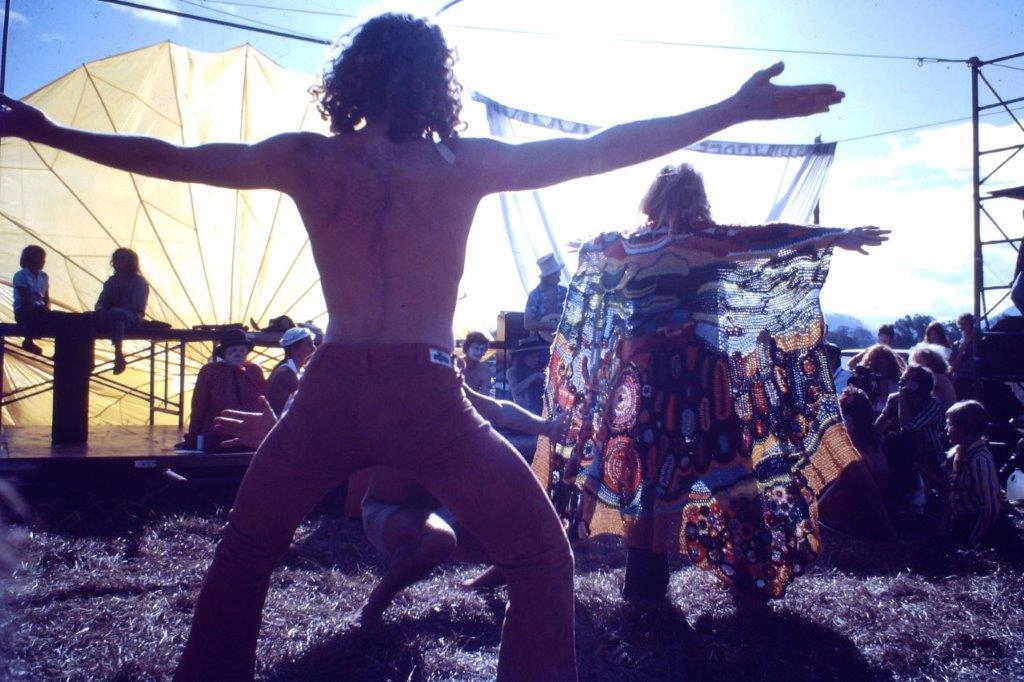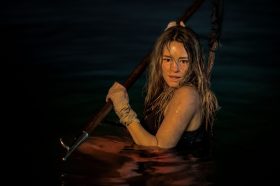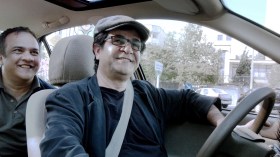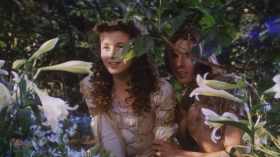In 1973, a radical 10-day festival transformed the sleepy dairy-and-bananas town of Nimbin, changing the Northern Rivers region of NSW forever – mostly for the better, according to writer-director Wendy Champagne’s inspiring documentary Aquarius.
There were problems, of course, as there always are when idealistic 20-year-olds come together and attempt communal living, alongside a fair bit of nudity, free love, drug-taking and pit toilets that involve ‘sitting in a circle having a crap’. But more than 50 years later, the largely peaceful and stunningly well-organised event remains an important example of what’s possible when creative people get together and try to make a new world.
Watch the Aquarius trailer.
Literally painting the town of Nimbin (original population 300) in rainbow colours, the 1973 Aquarius Festival saw 10,000 artists, hippies, activists and students arrive in the fields to camp out, play guitars, skinny-dip in the river, and talk about how to combat the coming environmental crisis and Australia’s consumerist society. The result was a communal event that continues to have social and political ripples for those who attended and Australian society at large – even though we’re still battling the same huge problems.
ScreenHub: Aquarius documentary to open Byron Bay Film Festival
It would be lazy shorthand to call the Nimbin Aquarius Festival ‘Australia’s version of Woodstock’, for as Johnny Allen, the festival’s Cultural Director says, ‘It was anti-Woodstock’. Costing just $5 to attend, the organisers didn’t want to charge attendees ‘to sit and watch rockstars’; they wanted a communal festival where the participants literally were the program.
Allen is just one of the many original festival organisers who appear both as present-day talking heads and as their more youthful counterparts seen in archival video, 70s news footage or Super-8 film. Key participants include festival director Graeme Dunstan (still jaunty with his long white beard and a feather in his hat), who is still a resident of the region.
Aquarius: politics
Dunstan recounts the political context of the early 70s, with very real fears for young men around conscription, and his own radicalisation after being employed by ASIO to report on his fellow students’ anti-Vietnam and Women’s Movement activism.
Other interviewees include Robbie Swan, Daniela Torsh and Leila ‘Teena’ Wedd. It’s interesting to note how, now aged in their 70s and beyond, they all seem to retain a youthfulness and zesty silver style, as if creativity and political engagement have kept their fires going.
Edited and co-written by Karin Steininger ASE, Aquarius is a documentary made up of 95% archival footage. The late 60s and early 70s saw the flourishing of accessible home movies, film collectives and experimental filmmaking in Australia. While there wasn’t social media at the time, cameras were still out in hordes at the festival, which saw Australia’s first experiment in cable television.
The creative group Bush Video Archive built a network throughout the town of Nimbin and broadcast footage during the time, including a live birth, permitted by one very brave woman. (No wonder the gentle townsfolk, who ‘weren’t entirely against’ the festival when originally consulted by organisers, changed their minds later when the festival never really left town.)
Alongside footage provided by the Bush Video Archive collective, the documentary includes material provided by the Aquarius Filmmakers Collective, the Anthony Lupi Archive, and the University of NSW Architecture Students Project. (Architecture students, incidentally, seem to have been essential in the smooth running and designing of the festival’s infrastructure, and you can imagine that with the demise of Australian university campus culture, the vibe is very different these days.)
Sifting through the sheer quantity of grainy, experimental footage must have been an enormous and overwhelming task for Champagne and Steininger. How many shots of hairy, skinny, white youths can one film include? How many ponchos, guitars, geodesic domes and misty mornings?
But it holds together, and a lively and sensitive score by Damien Lane helps bind the whole into an enjoyable and engaging taste of the times and the context.
Aquarius: stories
There are so many stories here, almost too many to contain: of the constant threat of police brutality; of radical activists bumping up against peace-loving hippies and mystics; of artists like the 20-year-old French Philippe Petit, entrancing the crowds with his highwire fire-twirling and bare-chested unicyling.
There’s Rhoda Roberts, Arts executive and Native Title Holder (and also an executive producer on the film) talking about growing up in the nearby Lismore region where Aboriginal people were not then recognised, and about her father, Uncle Lyle Roberts, performing an early ‘Welcome to Country’ ceremony that helped lift the idea of an Indigenous curse.
Personally, I loved seeing the small and contrary glimpses from the festival – one woman saying she was in an open relationship at the time and fully enjoyed herself at the event; while another saying how ‘free love’ was confusing and worked better for men than women.
Later, we hear about the 80 communes that sprang up from the festival, and the way the men often shirked the work and let the women bare the burden. It’s these moments that hint at why progressive social movements fall down and disintegrate. The film gamely acknowledges the ways weed-selling commerce destroyed higher ideals and divided communities.
Nevertheless, Aquarius is a convincing and positive portrait both of the festival and its role in creating alternative communities in the region. The documentary concludes with scenes about the successful anti-logging ‘rainforest wars’ that led to the creation of the World Heritage listed Nightcap National Park in 1983, the defence of the Daintree and the Franklin River in Tasmania, and the message that people really can change the world.
It’s a welcome reminder.
Aquarius is currently in cinemas through Madman.
Actors:
Director:
Wendy Champagne
Format: Movie
Country: Australia
Release: 14 November 2024





